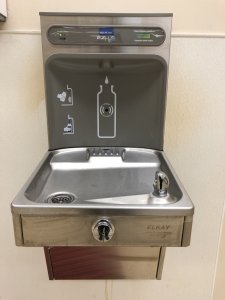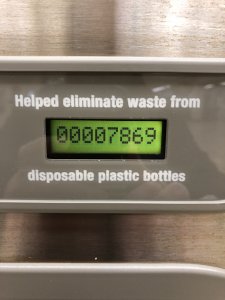By Karen Dyer
Sustainability is not just a buzz word at Saint Mary-of-the-Woods College. It’s an institutional value in action.
As SMWC recognizes Earth Day this week, the College announced it will be replacing a number of standard water fountains throughout campus with water bottle filling stations this spring and summer in order to provide students, faculty and staff with a more sustainable option for hydration.
The College previously invested in 10 filling stations throughout campus beginning in 2014 and was an early adopter of the sustainable water movement – a sustainable practice popularized throughout colleges and universities as a way to encourage better health through water drinking and sustainable institutional practices. In 2020, as standard water fountains everywhere began being covered in plastic to prevent the spread of COVID-19, water filling stations remained open for use throughout campus.
Plans include finishing installation throughout Le Fer hall and three other academic buildings. The new residence and dining hall, now under construction, will be equipped with filling stations.
Each filling station records the number of plastic disposable bottles saved as it is utilized. To date, filling stations at SMWC have kept 120,000 plastic bottles from going into landfills, while also saving the energy required to fabricate the plastic per bottle.
“When you take a good look our institution, our policies and practices, you can see strong evidence of our commitment to our students and values in everything that we do,” said Janet Clark, Ph.D., vice president for academic and student affairs. “Our values are embedded in our curriculum which is part of what makes a Woods experience one that prepares our students so wholly. Water is such an important resource, and it says a lot about our institution that we are willing to invest in sustainable practices that are good for our community and the environment.”
Katelyn Johnson, president of the SMWC Sustainability Club, a student-led organization, says that they encourage The Woods community to discontinue the use of disposable plastic bottles and opt for a more eco-friendly, reusable water bottle.
“As a club that represents one of the main pillars of our college, we believe that by saving water bottles and other plastics from our waterways and landfills, we are working to protect the Earth. Our club is largely education-based, and we put a great deal of effort into advocating for simple ways that we as individuals can make lifestyle changes that have a much greater impact down the line,” said Johnson.
In preparing for the installation of additional filling stations throughout campus to replace old water fountains and to provide filtered water in buildings where the only water access has been from expensive five-gallon bottle dispenser units, the College assessed the water quality of the filtered stations.
“The water bottle filling stations were tested, and the results were excellent. Nothing was detected and the water is of high quality and is perfectly safe to drink,” explained Jim Brinson, Ph.D., associate professor of ecology at SMWC.
Water bottle filling stations are equipped with high-performance filters which on average remove 99 percent of contaminants such as lead, chlorine and particulates from the water, according to BeCause Water, which leads to better water quality and enhanced taste as compared to that from the regular tap.
A study by the Pacific Institute by Peter Gleick and Heather Cooley from 2007, estimates that it takes 2,000 times more energy to produce bottled water as compared to tap water. EarthDay.org reports that a million plastic bottles are purchased each minute across the world, which equates to 50 billion bottles per year – that’s 13 bottles per month for every person in the United States. Only 23 percent of those bottles will be recycled.
“Not only does this fit into our value for sustainability of the environment, it is also a fit for financial sustainability. This is a smart move economically for the College as replacing five-gallon water dispensers throughout campus will pay for the investment in the new water bottle filling stations in a little more than one year,” added Clark.
Johnson added, “The importance of The Woods modeling sustainable behaviors rests on a variety of reasons relating to both our past and our future. Not only does SMWC have a rich history of sustainable living and eco-justice, tracing all the way back to Saint Mother Guerin’s values, but also the current students at The Woods also feel an immense responsibility to give back to our planet and to lead by example. It has never been as important as it is today to advocate for change and spread awareness about eco-friendly living.”



0 Comments